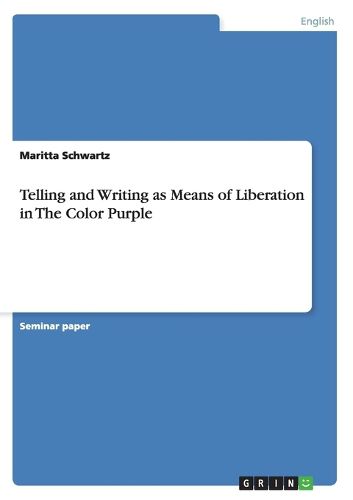Readings Newsletter
Become a Readings Member to make your shopping experience even easier.
Sign in or sign up for free!
You’re not far away from qualifying for FREE standard shipping within Australia
You’ve qualified for FREE standard shipping within Australia
The cart is loading…






Seminar paper from the year 1998 in the subject American Studies - Literature, grade: 2 (B), Ruhr-University of Bochum (English Seminar), course: Literatur III, 5 entries in the bibliography, language: English, abstract: Introduction This essay is going to deal with telling and writing as a means of liberation in the novel The Color Purple. Liberation in this context means, of course, women’s liberation. The paper comprises the analysis of the protagonist’s motivation for writing, its effects on her and the significance of different dialects. Furthermore the effects of the literary form of the letter as means of articulation will be explained and also the influence of Shug and her feminist language on Celie. Motivation for writing Already at the opening of the novel a reason for Celie’s writing is given.: You better not tell anybody but God. It’d kill your mammy.1 Celie takes this warning literally. She is frightened of her father and therefore obeys. Another motivation for Celie’s writing we get to know from one of Nettie’s letters to Celie: …I remember one time you said your life made you feel so ashamed you couldn’t even talk about it to God, you had to write it, bad as you thought your writing was. Well, now I know what you meant.2 Celie feels guilty and ashamed, because of the alleged incest with her father. She is not allowed to tell anybody (certainly not her mother) but needs to articulate herself somehow to enable herself to cope with her situation. So Celie starts to write her letters to God, when at the age of 14 years her record of sorrow and pain begins. Celie loses her mother and later on also Nettie, her sister. From then on writing becomes even more significant, for it is also a substitute for the mother’s and sister’s missing love.3 1 Walker, Alice; The Color Purple, London, 1992. (p. 3) 2 ebenda, p. 110 3 Fifer, Elizabeth; The Dialect And Letters of The Color Purple in: Rainwater C., Scheick, W: J. (eds.); Contemporary American Woman Writers, Le
$9.00 standard shipping within Australia
FREE standard shipping within Australia for orders over $100.00
Express & International shipping calculated at checkout
Seminar paper from the year 1998 in the subject American Studies - Literature, grade: 2 (B), Ruhr-University of Bochum (English Seminar), course: Literatur III, 5 entries in the bibliography, language: English, abstract: Introduction This essay is going to deal with telling and writing as a means of liberation in the novel The Color Purple. Liberation in this context means, of course, women’s liberation. The paper comprises the analysis of the protagonist’s motivation for writing, its effects on her and the significance of different dialects. Furthermore the effects of the literary form of the letter as means of articulation will be explained and also the influence of Shug and her feminist language on Celie. Motivation for writing Already at the opening of the novel a reason for Celie’s writing is given.: You better not tell anybody but God. It’d kill your mammy.1 Celie takes this warning literally. She is frightened of her father and therefore obeys. Another motivation for Celie’s writing we get to know from one of Nettie’s letters to Celie: …I remember one time you said your life made you feel so ashamed you couldn’t even talk about it to God, you had to write it, bad as you thought your writing was. Well, now I know what you meant.2 Celie feels guilty and ashamed, because of the alleged incest with her father. She is not allowed to tell anybody (certainly not her mother) but needs to articulate herself somehow to enable herself to cope with her situation. So Celie starts to write her letters to God, when at the age of 14 years her record of sorrow and pain begins. Celie loses her mother and later on also Nettie, her sister. From then on writing becomes even more significant, for it is also a substitute for the mother’s and sister’s missing love.3 1 Walker, Alice; The Color Purple, London, 1992. (p. 3) 2 ebenda, p. 110 3 Fifer, Elizabeth; The Dialect And Letters of The Color Purple in: Rainwater C., Scheick, W: J. (eds.); Contemporary American Woman Writers, Le